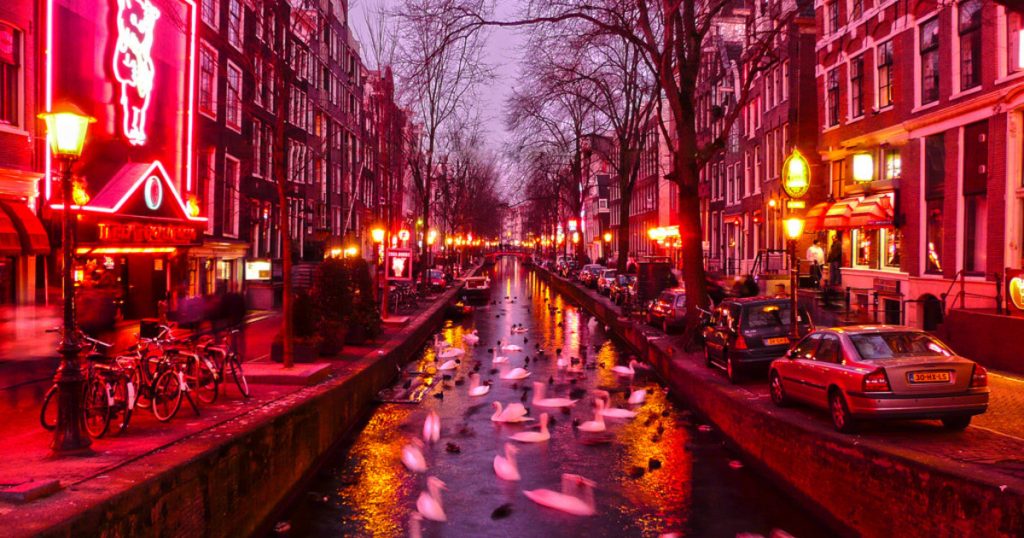By Jonathon Van Maren
A few months ago, I flew to the Netherlands to cover the Dutch March for Life in the Hague. The organizers had asked me if I would mind staying with a pro-life supporter near the site of the March, a young fellow who rented a little condo nearby—about a ten-minute walk from the palace of the Royal Family. I didn’t mind, of course, and a few minutes after my arrival around 9 PM my host was asking me if I wanted a short walking tour of The Hague. He would even show me his mission field, he said.
I didn’t realize until about fifteen minutes later what he meant when he referred to his mission field—it was the notorious red light districts of The Hague. He would scurry from booth to booth, offering the girls on display behind the windows little Christian tracts. The reactions he got ranged from amusement to gratitude, and many of the girls would talk to him about their experiences. Those stories were almost universally soul-crushing.
From what I could see—I was hanging back, very uncomfortable with being anywhere close to this place—the majority of the men walking into the district were Muslim immigrants. My host confirmed this. If anyone would look at one of “their” girls and make a crude comment, he told me, these men would be livid—but these girls were just garbage to them, nothing more than meat. “They’re not real people to them,” he said, and so they can come and buy another fifteen-minute sliver of their innocence, extract what pleasure they can from the bodies of these girls, and then leave with hard eyes and crude laughter.
“They treat the girls rough,” he told me. They often push the girls around, or grab them by the chest. They think it’s funny. The girls aren’t people, after all. It is profoundly ugly and depressing to watch men walk past the windows. They look at the girls, scan their bodies, and move on. Eyes on, eyes off, rejected. Weighed in the balances and found wanting. Not a good enough piece of meat. Next booth. Most of these girls must have been loved once, by friends and family members. And now this. It is absolutely devastating to watch.
It is not just the red light districts of the Hague, either. Amsterdam’s infamous brothels are now attracting attention—the problem there is not immigrants, but cruel British tourists. The Daily Mail on Sunday recently published an expose of what is taking place in plain sight:
Scores of human trafficking trials in the Dutch courts have exposed the horrific truth – that many of the smiling window girls have been brought from Eastern Europe by ruthless pimps who think nothing of handing out a beating, a knifing or rape…Spurred on by horrific tales of women suffering coerced cosmetic surgery and forced abortions, a growing number of politicians and campaigners in Holland have turned against the sex trade.
…Now a new law, likely to come into force next year, will make it an offence, punishable by up to four years in jail, for punters to have sex with a prostitute they know – or suspect – has been trafficked.
Stories of trafficking have plagued these districts almost since the time that they were first set up, and that hasn’t slowed the rate of customers—even with 60% of the girls working there reporting sexual assault. Again, the problem is a deep, depressing one: Those buying sex don’t view the girls they buy as real people. They’re simply human dolls to be used briefly. The buyers can ignore the fact that their lust and selfishness is contributing to the living hells that many of these girls experience:
That time cannot come fast enough for Angelica, a Romanian who spent five nightmarish years as a captive in the Amsterdam windows. She tells us her chilling story – about the transformation of a bright, ambitious teenage student into a broken woman, aged just 22. As a 17-year-old she was lured to London by a man she thought of as a boyfriend, having been told she would get a well-paid job as a hair stylist.
Unknown to her, at the other end of the easyJet flight was a willing customer, but he hadn’t paid for a haircut – it was Angelica he wanted. Her passport was taken away and she was effectively taken prisoner. Soon she was ‘sold on’ and installed behind a grubby window of an Amsterdam brothel.
‘The man who brought me to England and then to Holland used me like a piece of meat,’ she says. ‘When I saw the brothels with all the girls in the windows, I cried. I cried very hard because they looked horrible, and I knew that was what was coming to me.’
She was told she owed £27,000 to the traffickers because they falsely said her family had been paid off not to report her disappearance. Her £350 daily earnings went straight to the brutal pimp who gave her just £9 for food. He also raped and beat her. Clients were charged £35 for straight sex – or £90 without a condom. Angelica was cut on the face with a knife by her captors when she tried to refuse a client’s demand to have unprotected sex, and she was threatened with much worse if it happened again.
Little by little, the message got through that her body now belonged to someone else. She adds: ‘Pimps would tell me it’s legal, that they can do what they want to me because the police are on their side and not mine.’ Of her clients, she says: ‘The English are the worst. They treat me like dirt. One even urinated all over me and laughed while he was doing it. They are always drunk. They hurt me.’
Her phone was taken away and she was given a basic Nokia with a few pounds’ credit so that she could keep in touch with her pimp. Angelica worked 12-hour shifts, sometimes sleeping in her brothel in case a punter wanted sex early the next morning. Eventually one of the support agencies whose staff tour the area came round and on their 12th visit she told them she had been trafficked and wanted to escape.
Next, a plain-clothes policeman arrived posing as a client and she spilled out her story. Finally, police took her to a refuge outside the city. But her time in the windows had left a grim legacy. She had contracted a venereal disease, was forced into an abortion, and for a long time her family refused to speak to her – convinced by the traffickers she had entered prostitution willingly.
I wrote about this horrific feedback loop in Chapter 7 of my 2016 book The Culture War—how our culture buys and sells the girls, hires abortionists to kill the babies in their womb—their bodies are for the pleasure of customers, after all, not for the nurture of children—and commodifies human beings as products to be consumed. This industry—which Dr. Mary Anne Layden refers to as “the sexual exploitation industry”—is wicked and has no place in a civilized society. It also has a horrible, deadening effect on the souls of those who engage with it:
Despite the horrific reality exposed by Angelica’s story, the men in the red light district do not seem to care if the women have been trafficked. One of the British tourists we spoke to says: ‘I assumed one woman was trafficked because of the way it was set up with a big guy standing outside. The woman looked younger than 16 and appeared to be Polish, Russian, Albanian or Romanian.’
Another says: ‘One of the women in a window had bruises and cuts. I asked her if she was OK and she just smiled and said she was.’ A third shrugs and says: ‘They all want it don’t they, if it’s legal? If it’s behind the window and it’s obvious and blatant and in your face, that means it’s not underground, it’s not illegal, and they want it.’
It takes a deliberate lack of humanity to refuse to see the humanity in another—especially when you are avoiding their humanity intentionally, in order to use them. These careless young men ignore the pain they see in the faces of the girls they buy so they can have a fun stag party or night of sex and drinking, leaving behind scars and brokenness. Fortunately, there are many in the Netherlands who are seeing this industry for what it is—and politicians like Gert Jan Segers, a principled and profoundly humane man who I had the pleasure of meeting back in December—who are willing to fight back:
But stories like Angelica’s have swayed public opinion in Holland and today thousands of protesters are expected to march in The Hague – home of The Netherlands’ government – to demand that the country’s brothels, legalised in 2000, are again outlawed…Dutch MP Gert-Jan Segers, leader of the Christian Union party in the coalition government, says: ‘We legalised prostitution in 2000. The idea was it was giving women their freedom and to get rid of the criminality. But we took it away from being linked to freedom and we linked it to human trafficking. The red light district is a dark place. It’s chilling, it’s humiliating – it makes me cry. For a long time we just accepted it – there are tour guides telling naughty and funny stories about the place. But the reality is that it’s just commercialised rape.’
‘As well as increasing the minimum age of prostitutes from 18 to 21, the legislation could make men far more wary about paying for sex. ‘We are making the buyers responsible,’ says Mr Segers. ‘They should be prosecuted if they know or could have known that they are making use of a victim of forced prostitution. From a human rights perspective, De Wallen is a terrible place. I hope that this law will be a clear warning that if you cross that line you will be prosecuted, including tourists.’
I hope men like Segers prevail, and this this national shame is removed. As our culture faces the #MeToo movement and begins to discuss what sorts of behaviors should not be tolerated in society, perhaps we can also begin to purge our societies of places where, as Segers so chillingly but eloquently noted, “commercialized rape” is a matter of business.
__________________________________________________________________
For anyone interested, my book on The Culture War, which analyzes the journey our culture has taken from the way it was to the way it is and examines the Sexual Revolution, hook-up culture, the rise of the porn plague, abortion, commodity culture, euthanasia, and the gay rights movement, is available for sale here.








